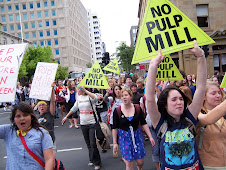More than $50 million of public money is going to be spent on the pulp mill, but once it's built all the profits will stay with Gunns and not be given to taxpayers. Think about the other useful things our government could spend $50 million on that aren't environmentally destructive.
Public money in the pipeline
Article from: The Mercury
SUE NEALES March 03, 2008
THE Lennon Government may declare the 35km water pipeline supplying the proposed Gunns pulp mill in the Tamar Valley "critical state infrastructure".
The move would see Tasmanian taxpayers pay for construction of the pipeline – expected to cost more than $50 million – from the Trevallyn Dam to the mill site 36km north of Launceston.
The 19km effluent pipe from the pulp mill to the Five Mile Bluff ocean outfall on Bass Strait is also likely to become state infrastructure.
Premier Paul Lennon has confirmed he has asked Infrastructure Minister Steve Kons to investigate all "community benefits" that would flow from state ownership of the mill's water and effluent pipelines.
"I have said I want the issue looked at – it makes sense to me in the context of new infrastructure going into the ground," Mr Lennon said.
"It would be wrong for the Government not to look at what community benefit can be extracted by us in the longer term (from the pipeline) with a project of this size."
He said classing the pipeline as essential state infrastructure would allow other industries at Bell Bay or farms along its route to access more water for industrial or irrigation use.
The Premier also suggested that state ownership of the effluent pipeline might solve some of Launceston's sewage disposal problems, while the water pipeline might be used to give George Town residents better drinking water.
But landholders who have been approached by Gunns with offers of financial compensation in return for allowing the pipeline to pass under their properties are suspicious of the government move.
They believe that once the Government declares the pipeline essential state infrastructure and takes it from Gunns, it will trigger the compulsory acquisition of land for the pipeline regardless of their wishes.
Orchardist Justin Miller, of Hillwood on the East Tamar, refused to countenance Gunns' putting its pipeline through his 110ha farm.
"From the word go we told them (Gunns) we would not let their pipeline on our land," said Mr Miller, whose fourth-generation family orchard is about 6km south of the planned mill.
"It would have meant a lot of mucking around moving our existing irrigation system and probably some trees and we just didn't want that.
"But we are also opponents of the mill full-stop. It won't do anything for Tasmania's image as a clean green state and that's what allows us to export our apples and cherries."
Mr Miller said that since his family turned Gunns down he had no idea whether the company had decided to reroute the pipeline or whether the property was still in its path.
"But if the state takes it over it may be quite a different scenario – they won't need people's permission in that case," he said.
The pipeline, which will cross beneath the Tamar River from North Riverside to the University of Tasmania at Newnham, will take 72 megalitres of water from the Trevallyn Dam a day for the mill and pump 64 megalitres of effluent daily into Bass Strait.
The $2 billion pulp mill lost its Project of State Significance status – which would have permitted compulsory land corridor acquisitions by Gunns – when the company withdrew from assessment by Tasmania's main planning body last March.
Gunns executive chairman John Gay last week denied he had specifically asked the Government to take over the mill's water and effluent pipelines.
But he admitted he had discussed the matter with the Launceston City Council, which could have then approached the Government.
"Gunns is prepared to make any part of this pulp mill available (to the state), where it can be converted and where other Tasmanian industries or people could get benefit from it," Mr Gay said.
"We have offered the Government that – and in my view there would be good reasons for the water pipeline to be state-owned serving other industries."
The proposed pipeline route traverses about 60 properties between Trevallyn and the mill site.
More than a dozen landholders are understood, like the Millers, to be implacably opposed to the pipeline crossing under their land within a 10m wide corridor or easement.
The pipeline's total cost is uncertain since its exact size, volume and materials will not be decided until the Lennon Government decides whether to build the pipeline itself.
The state has allocated $80 million from the $350 million sale of Hobart Airport last year to invest in "urgent water projects" in regional communities.
In addition the Rudd Government has promised $140 million to "drought-proof" Tasmania with new irrigation schemes, but it is not clear whether a state-owned pipeline to the pulp mill would qualify for that funding.
Land owned by the West Tamar Council near Trevallyn Dam poses a particular problem to Gunns.
Following a unanimous vote by the council last August that it had no faith in the mill process, aldermen decided it would be inconsistent to allow the pipeline corridor to pass beneath council-owned land.
Buck Emberg, co-chair of the Tasmanians Against the Pulp Mill "pipeline initiative", said Government plans to build and own the pipeline were the precursor to compulsory land acquisitions.
"We predict the Government will pass laws for the pulp mill which would take the power from the people and give it to the Government who will give it to Gunns," Mr Emberg said yesterday.
Monday, March 3, 2008
Subscribe to:
Post Comments (Atom)
.jpg)
.jpg)

No comments:
Post a Comment